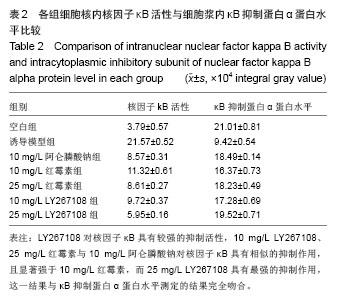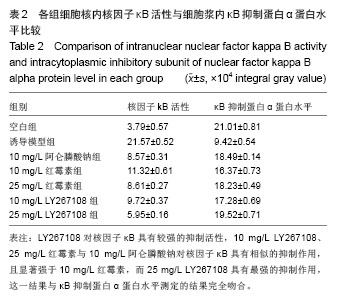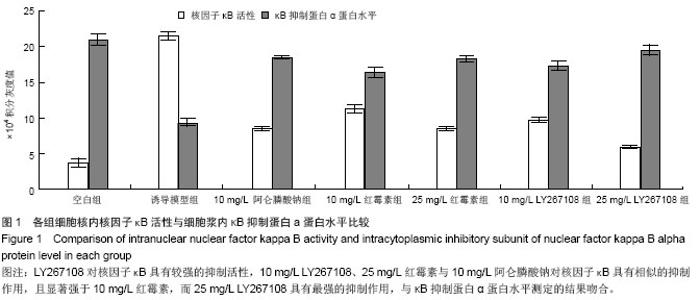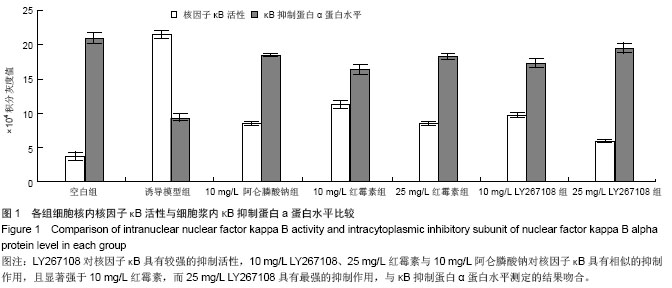| [1]Gallo J , Goodman SB , Konttinen YT , et al.Osteolysis around total knee arthoplasty: a review of pathogenetic mechanisms. Acta Biomaterialia. 2013;9(9):8046-8058.
[2]O'Neill SC, Queally JM, Devitt BM, et al. The role of osteoblasts in peri-prosthetic osteolysis. Bone Joint J. 2013; 95-B(8):1022-1026.
[3]Holt G, Murnaghan C, Reilly J, et al.The biology of aseptic osteolysis.Clin Orthop Relat Res. 2007;460:240-252.
[4]Stadelmann VA, Terrier A, Pioletti DP. Microstimulation at the bone-implant interface upregulates osteoclast activation pathways. Bone. 2008;42(2):358-364.
[5]Boyce BF, Xing L. The RANKL/RANK/OPG pathway. Curr Osteoporos Rep. 2007;5(3):98-104.
[6]Wedemeyer C, Neuerburg C, Pfeiffer A, et al.Polyethylene particle-induced bone resorption in alpha-calcitonin gene-related peptide-deficient mice.J Bone Miner Res. 2007; 22(7):1011-1019.
[7]Liu Q, Wu H, Chim SM, et al.SC-514, a selective inhibitor of IKKβ attenuates RANKL-induced osteoclastogenesis and NF-κB activation. Biochem Pharmacol. 2013;86(12): 1775-1783.
[8]Yoon WJ, Kim KN, Heo SJ, et al.Sargachromanol G inhibits osteoclastogenesis by suppressing the activation NF-κB and MAPKs inRANKL-induced RAW 264.7 cells. Biochem Biophys Res Commun. 2013;434(4):892-897.
[9]Ren W, Blasier R, Peng X, et al.Effect of oral erythromycin therapy in patients with aseptic loosening of joint prostheses. Bone. 2009;44(4):671-677.
[10]Purdue PE, Koulouvaris P, Nestor BJ, et al.The central role of wear debris in periprosthetic osteolysis.HSS J. 2006;2(2): 102-113.
[11]Fecik RA, Ngu Yen PL, VenkaTraman L. Approaches to the synthesis of immunolides: selective immune-modulatory macrolides for cystic fibrosis. Curr Opin Drug Discov Devel. 2005;8(6):741-747.
[12]Greenwood B1, Dieckman D, Kirst HA, et al.Effects of LY267108, an erythromycin analogue derivative, on lower esophageal sphincter function in the cat. Gastroenterology. 1994;106(3):624-628.
[13]吴岚,张为革,赵丽娟,等.十二元环红霉素衍生物对T淋巴细胞增殖和细胞周期的影响[J].沈阳药科大学学报,2005, 22(5): 390-394.
[14]Tsubaki M, Komai M, Itoh T, et al. Nitrogen-containing bisphosphonates inhibit RANKL- and M-CSF-induced osteoclast formation through the inhibition of ERK1/2 and Akt activation. J Biomed Sci. 2014;21(1):10.
[15]GuezGuez A, Prod'homme V, Mouska X, et al. 3BP2 adapter protein is required for receptor activator of NFκB ligand (RANKL)-induced osteoclast differentiation of RAW264.7 cells. J Biol Chem. 2010;285(27):20952-20963.
[16]Yang J, Zeng Z, Wu T, et al. Emodin attenuates high glucose-induced TGF-β1 and fibronectin expression in mesangial cells through inhibition of NF-κB pathway. Exp Cell Res. 2013;319(20):3182-3189.
[17]Singh PP, van der Kraan AG, Xu J, et al. Membrane-bound receptor activator of NFκB ligand (RANKL) activity displayed by osteoblasts is differentially regulated by osteolytic factors.Biochem Biophys Res Commun. 2012;422(1):48-53.
[18]Qu S, Bai Y, Liu X, et al. Study on in vitro release and cell response to alendronate sodium-loaded ultrahigh molecular weight polyethylene loaded with alendronate sodium wear particles to treat the particles-inducedosteolysis. J Biomed Mater Res A. 2013;101(2):394-403.
[19]Abdelmoula LC, Ben M'barek R, Ben Hadj Yahia C, et al. Bisphosphonates: indications in bone diseases other than osteoporosis.Tunis Med. 2011;89(6):511-516.
[20]Wilkinson JM, Little DG.Bisphosphonates in orthopedic applications.Bone. 2011;49(1):95-102.
[21]Ren W, Markel DC. Emerging ideas: can erythromycin reduce the risk of aseptic loosening?Clin Orthop Relat Res. 2011; 469(8):2399-2403.
[22]Ren W, Zhang R, Hawkins M, et al. Efficacy of periprosthetic erythromycin delivery for wear debris-induced inflammation and osteolysis. Inflamm Res. 2010;59(12):1091-1097.
[23]Markel DC, Zhang R, Shi T, et al. Inhibitory effects of erythromycin on wear debris-induced VEGF/Flt-1 gene production andosteolysis. Inflamm Res. 2009;58(7):413-421.
[24]Mereu A, Moriggi E, Napoletano M, et al. Design, synthesis and in vivo activity of 9-(S)-dihydroerythromycin derivatives as potent anti-inflammatory agents. Bioorg Med Chem Lett. 2006; 16(22):5801-5804.
[25]Lee YH, Schiemann WP.Fibromodulin suppresses nuclear factor-kappaB activity by inducing the delayed degradation of IKBAvia a JNK-dependent pathway coupled to fibroblast apoptosis.J Biol Chem. 2011;286(8):6414-6422.
[26]Lopez-Granados E, Keenan JE, Kinney MC, et al. A novel mutation in NFKBIA/IKBA results in a degradation-resistant N-truncated protein and is associated with ectodermal dysplasia with immunodeficiency. Hum Mutat. 2008;29(6): 861-868. |



